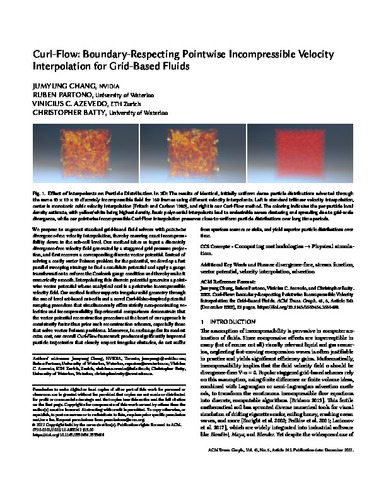| dc.contributor.author | Chang, Jumyung | |
| dc.contributor.author | Partono, Ruben | |
| dc.contributor.author | Azevedo, Vinicius C. | |
| dc.contributor.author | Batty, Christopher | |
| dc.date.accessioned | 2024-04-22 14:44:48 (GMT) | |
| dc.date.available | 2024-04-22 14:44:48 (GMT) | |
| dc.date.issued | 2022-12 | |
| dc.identifier.uri | https://doi.org/10.1145/3550454.3555498 | |
| dc.identifier.uri | http://hdl.handle.net/10012/20466 | |
| dc.description | ©ACM, 2022. This is the author's version of the work. It is posted here for your personal use. Not for redistribution. The definitive Version of Record was published in ACM Transactions on Graphics, https://doi.org/10.1145/3550454.3555498. | en |
| dc.description.abstract | We propose to augment standard grid-based fluid solvers with pointwise divergence-free velocity interpolation, thereby ensuring exact incompressibility down to the sub-cell level. Our method takes as input a discretely divergence-free velocity field generated by a staggered grid pressure projection, and first recovers a corresponding discrete vector potential. Instead of solving a costly vector Poisson problem for the potential, we develop a fast parallel sweeping strategy to find a candidate potential and apply a gauge transformation to enforce the Coulomb gauge condition and thereby make it numerically smooth. Interpolating this discrete potential generates a point-wise vector potential whose analytical curl is a pointwise incompressible velocity field. Our method further supports irregular solid geometry through the use of level set-based cut-cells and a novel Curl-Noise-inspired potential ramping procedure that simultaneously offers strictly non-penetrating velocities and incompressibility. Experimental comparisons demonstrate that the vector potential reconstruction procedure at the heart of our approach is consistently faster than prior such reconstruction schemes, especially those that solve vector Poisson problems. Moreover, in exchange for its modest extra cost, our overall Curl-Flow framework produces significantly improved particle trajectories that closely respect irregular obstacles, do not suffer from spurious sources or sinks, and yield superior particle distributions over time. | en |
| dc.description.sponsorship | Natural Sciences and Engineering Research Council of Canada. | en |
| dc.language.iso | en | en |
| dc.publisher | Association for Computing Machinery | en |
| dc.relation.ispartofseries | ACM Transactions on Graphics;41(6) | |
| dc.subject | computing methodologies | en |
| dc.subject | physical simulation | en |
| dc.subject | divergence-free | en |
| dc.subject | stream function | en |
| dc.subject | vector potential | en |
| dc.subject | velocity interpolation | en |
| dc.subject | advection | en |
| dc.title | Curl-Flow: Boundary-respecting pointwise incompressible velocity interpolation for grid-based fluids | en |
| dc.type | Article | en |
| dcterms.bibliographicCitation | Chang, J., Partono, R., Azevedo, V. C., & Batty, C. (2022). Curl-flow. ACM Transactions on Graphics, 41(6), 1–21. https://doi.org/10.1145/3550454.3555498 | en |
| uws.contributor.affiliation1 | Faculty of Mathematics | en |
| uws.contributor.affiliation2 | David R. Cheriton School of Computer Science | en |
| uws.typeOfResource | Text | en |
| uws.peerReviewStatus | Reviewed | en |
| uws.scholarLevel | Faculty | en |

